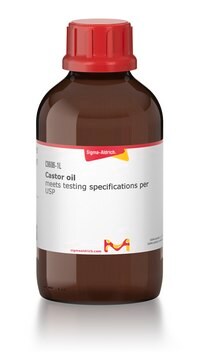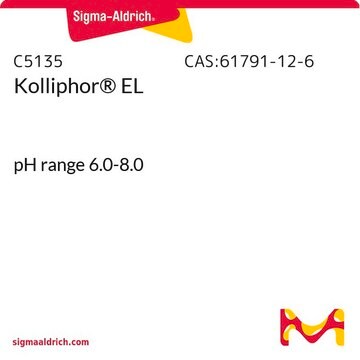Recommended Products
biological source
synthetic (organic)
Quality Level
form
liquid
optical activity
[α]20/D +5°, c = 5 in ethanol
refractive index
n20/D 1.478 (lit.)
bp
313 °C (lit.)
density
0.961 g/mL at 25 °C
lipid type
oils
Looking for similar products? Visit Product Comparison Guide
Application
Castor oil is a triglyceride obtained from Ricinus communis. It has been used to study its impact on rat lens condition. Castor oil has also been used as a test reagent for studying the dose-response relationship and mechanism of action of Saccharomyces boulardii by utilizing the rat model of castor oil-induced diarrhea.
Storage Class
10 - Combustible liquids
wgk_germany
awg
flash_point_f
Not applicable
flash_point_c
Not applicable
ppe
Eyeshields, Gloves
Certificates of Analysis (COA)
Search for Certificates of Analysis (COA) by entering the products Lot/Batch Number. Lot and Batch Numbers can be found on a product’s label following the words ‘Lot’ or ‘Batch’.
Already Own This Product?
Find documentation for the products that you have recently purchased in the Document Library.
Customers Also Viewed
Philippe Girard et al.
Digestive diseases and sciences, 48(4), 770-774 (2003-05-14)
For biotherapeutic agents, there is a lack of information on dose-response relationships and mechanism of action. The present study was designed to address these issues for Saccharomyces boulardii using the rat model of castor oil-induced diarrhea. A single dose of
Thomas Holm et al.
PloS one, 8(11), e79620-e79620 (2013-11-22)
Glutathione concentration in the lens decreases in aging and cataractous lenses, providing a marker for tissue condition. Experimental procedures requiring unfrozen lenses from donor banks rely on transportation in storage medium, affecting lens homeostasis and alterations in glutathione levels. The
Atul Pandey et al.
Hormones and behavior, 117, 104602-104602 (2019-10-28)
Juvenile hormone (JH) is a key regulator of insect development and reproduction. Given that JH commonly affects adult insect fertility, it has been hypothesized to also regulate behaviors such as dominance and aggression that are associated with reproduction. We tested
Yun Zhou et al.
Neurochemistry international, 123, 22-33 (2018-07-28)
Glutamate-ammonia ligase (glutamine synthetase; Glul) is enriched in astrocytes and serves as the primary enzyme for ammonia detoxification and glutamate inactivation in the brain. Loss of astroglial Glul is reported in hippocampi of epileptic patients, but the mechanism by which
Yumiao Zhang et al.
Nature communications, 7, 11649-11649 (2016-05-20)
Injectable hydrophobic drugs are typically dissolved in surfactants and non-aqueous solvents which can induce negative side-effects. Alternatives like 'top-down' fine milling of excipient-free injectable drug suspensions are not yet clinically viable and 'bottom-up' self-assembled delivery systems usually substitute one solubilizing
Our team of scientists has experience in all areas of research including Life Science, Material Science, Chemical Synthesis, Chromatography, Analytical and many others.
Contact Technical Service









